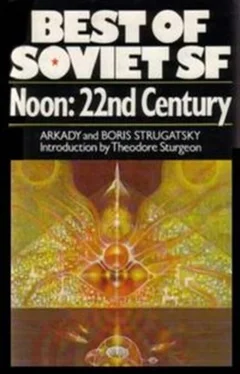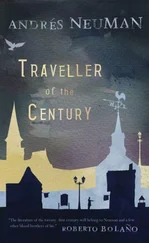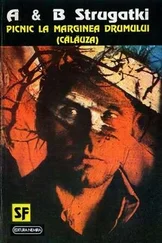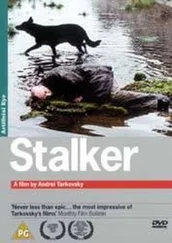Mboga walked next to Ryu with a light gliding step. The grass seemed to flow around him.
“On the other hand there are birds up here,” Ryu continued. “They’re very large and sometimes they fly very low. One almost grabbed my radar set.”
Komov, without slowing down, looked into the sky, shading his eyes with a hand. “By the way,” he said. “I should send a radiogram to the Sunflower. May I use your communicator?”
“By all means,” said Ryu. “You know, Percy Dickson wanted to shoot one. A bird, I mean. But Gorbovsky wouldn’t let him.”
“Why not?” asked Mboga.
“I don’t know,” said Ryu. “But he was dreadfully angry; he even wanted to take everyone’s weapons away.”
“He did take them away from us,” Fokin said. “There was a great flap at the Council. If you ask me, it became very ugly. Gorbovsky simply ladled out his authority on top of everyone.”
“Except Tora-Hunter,” noted Tanya.
“Yes, I took a gun,” Mboga said. “But I understand Gorbovsky. You don’t feel like shooting here.”
“Still, Gorbovsky is a peculiar man,” declared Fokin.
“Possibly,” said Ryu with restraint.
They approached the low circle of the door to the spacious laboratory dome. Over the dome three gridwork radar dishes turned in various directions.
“You can pitch your tents here,” said Ryu. “And if you need it, I’ll give you a team of cybers, and they’ll build you something more substantial.”
Komov looked at the dome, looked at the puffs of red and black smoke behind the laboratory, and then looked back at the gray roofs of the city and said guiltily, “You know, Ryu, I’m afraid we’ll be in your way here. Wouldn’t it be better if we got settled in the city? Eh?”
“Besides, there’s a smell of burning here,” added Tanya. “And I’m afraid of the cybers.”
“I’m afraid of the cybers too,” Fokin said decisively.
Offended, Ryu shrugged his shoulders. “As you like,” he said. “I think it’s very nice here myself.”
“Tell you what,” said Tanya. “We’ll put up the tents and you can move in with us. You’ll like it, you’ll see.”
“Hmm,” said Ryu. “Maybe… But for now you’re all invited to my place.”
The archaeologists stooped down and walked toward the low door. Mboga went last, and he did not even have to bow his head.
Ryu hesitated at the threshold. He looked back and saw the trampled ground, the yellowed crushed grass, the dismal pile of lithoplast, and he thought that somehow there really was a smell of burning here.
The city consisted of a single street, very broad, overgrown with thick grass. The street extended almost due north and south, and stopped close to the river. Komov decided to make camp in the center of the city. The setting up started at around 3:00 p.m. local time (a day on Leonida was twenty-seven hours some minutes).
The heat seemed to grow worse as the afternoon wore on. There was no breeze, and warm air shimmered over the gray parallelepipeds of buildings. It was a bit cooler only in the southern part of the city, near the river. There was a smell of, in Fokin’s words, hay and “a touch of chlorella plantation.”
Komov took Mboga and Ryu, who had offered his help, got in the helicopter, and set off for the boat to get equipment and provisions, while Tanya and Fokin surveyed the city. There was relatively little equipment, and Komov transferred it in two trips. When he had come back the first time, Fokin, while helping with the unloading, had stated somewhat pompously that all the buildings in the city were quite similar in size.
“Very interesting,” Ryu said politely.
This showed, Fokin stated, that all the buildings had one and the same function. “All we have to do is establish what,” he added as an afterthought.
When the helicopter returned the second time, Komov saw that Tanya and Fokin had set up a high pole and had raised over the city the unofficial flag of the Pathfinders-a white field with a stylized depiction of a heptagonal nut. A long time ago, almost a century back, one prominent spaceman and fervent opponent of the study of the evidence of extraterrestrial intelligence in outer space had once said heatedly that the only evidence that he was ready to consider irrefutable would be a wheel on an axle, a diagram of the Pythagorean theorem carved onto a cliffside, or a heptagonal nut. The Pathfinders had accepted the challenge and had emblazoned their flag with a depiction of a heptagonal nut.
Komov saluted the flag gladly. Much fuel had been burned and many parsecs had been traveled since the flag had been created. It had first flown over the circular streets of the empty city on Mars. At that time the fantastic hypothesis that both the city and the Martian satellites could have a natural origin had still had currency. At that time even the most daring Pathfinders merely considered the city and the satellites to be the sole remains of a mysterious vanished Martian civilization. And many parsecs had to be traveled, and much ground had to be dug, before only one hypothesis remained unrefuted: the empty cities and the abandoned satellites had been built by visitors from an unknown distant planetary system. But this city on Leonida…
Komov got the last pack out of the helicopter cabin, jumped into the grass, and slammed the door shut. Ryu went up to him, and said while rolling down his sleeves, “And now I must leave you, Gennady. I have a sounding in twenty minutes.”
“Of course,” said Komov. “Thank you, Ryu. Come have supper with us.”
Ryu looked at his watch and said, “Thank you, but I can’t guarantee it.”
Mboga, leaning his carbine against the wall of the nearest building, inflated a tent right in the middle of the street. He watched Ryu leave and then smiled at Komov, parting the gray lips on his small wrinkled face. “This is verily a planet with all the conveniences, Gennady,” he said. “Here we walk around weaponless, pitch tents right on the grass. And this…” He nodded in the direction of Fokin and Tanya. The Pathfinder archaeologist and the archaeological engineer, having trampled down the grass around them, were fussing over the autolab in the shade of a building. The archaeological engineer wore shorts and a silk sleeveless blouse. Her heavy shoes adorned the roof of the building, and her coverall lay next to the packs. Fokin, wearing gym shorts, was tearing off his sweat-drenched jacket.
“Good grief,” Tanya was saying, “How did you connect the batteries?”
“In a minute, in a minute, Tanya,” Fokin answered vaguely.
“No,” said Komov. “This isn’t Pandora.” He dragged a second tent out of the pack and set about fitting the rotary pump to it. No, this isn’t Pandora, he thought. On Pandora they had forced their way through murky jungles wearing heavy-duty spacesuits, carrying cumbersome disintegrators with the safety catches off. It squished underfoot, and with every step multilegged vermin ran every which way, while overhead two blood-red suns shone dimly through the tangle of sticky branches. And it was not only Pandora! On every planet with an atmosphere the Pathfinders and the Assaultmen moved with the greatest caution, driving before them columns of robot scouts, self-propelled biolabs, toxicanalyzers, condensed clouds of universal virophages. Immediately after landing, a ship’s captain was required to burn out a safety zone with thermite. It was considered an enormous crime to return to a ship without a preliminary, very careful disinfection and disinfestation. Invisible monsters more terrible than the plague or leprosy lay in wait for the unwary. It had happened only thirty years back.
It could happen even now on Leonida, the planet with all the conveniences. There were microfauna here too, and very abundant they were. But thirty years ago, small Doctor Mboga had found the “battery of life” on fierce Pandora, and Professor Karpenko on Earth had discovered bioblockading. One injection a day. You could even get by with one a week. Komov wiped his damp face and started undoing his jacket.
Читать дальше












